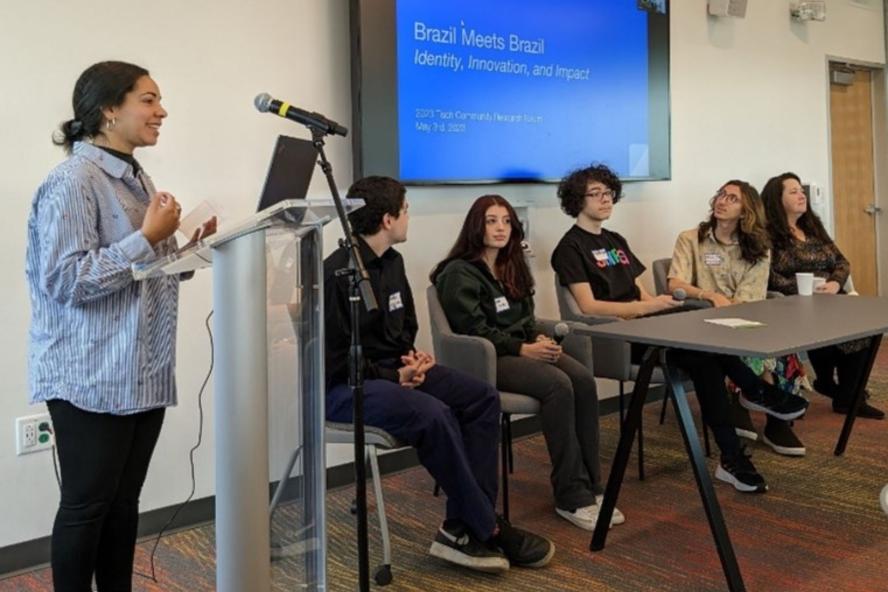2023 Tisch Community Research Forum: Identity, Impact, and Innovation

As we wrestle with ongoing questions around researcher positionality, new ideas, and different kinds of community outcomes, the second annual community forum provided an opportunity to share and learn from a wide range of community research. On May 3, 2023, Tisch College hosted Tufts students and community partners to share research from all disciplines, fields, and communities to expand our thinking about the role of identity, innovation, and impact. This event was a collaboration between TCRC and Tisch’s Student Programs team, with leadership from Tisch’s AmeriCorps VISTA Deepika Pahari.
Why hold a forum about community research? Community research is not only where “rubber meets road” for a civically engaged research institution, but it deepens the impact and relevance of research. The questions explored are particularly powerful when they emerge from communities themselves, whether the community is geographic in scope or describes groups of individuals with shared experiences. The forum’s theme reflected common elements in community research related to questions of (a) identity, considered both collectively and individually, (b) innovative ways to rethink our assumptions, and (c) the impact that community research can have by grappling with these questions collaboratively to inform policy and practice.
The keynote panel shared their experiences on “Brazil meets Brazil: Building community through heritage in Massachusetts museums,” a research project supported through a 2022 TCRC seed grant. Michaela Blanc (MA ’22, Museum Studies), Catarina Lindo (Somerville High School), Muri Mascarenhas (’26, Child Study and Human Development), João Pedro Medeiros (’25, SMFA), Theo Silva (Cambridge Rindge and Latin School), and Kat Powers (Executive Director, Somerville Media Center) worked closely with Tufts faculty Claudia Mattos Avolese (SMFA, Visual and Material Studies) over the past year to understand the extent of hidden Brazilian art and cultural objects across Massachusetts. They shared a systematic investigation to catalogue and research these objects, helping museums understand their own collections, which were often not on public display. The research team also interviewed current Brazilian artists living and working in Massachusetts, drawing connections in a continuum to present day.
This research underscores how important it is that institutions represent local communities. As Michaela explained, “visiting museums and seeing your heritage on display changes your perspective and the way you see the world.” High school student Catarina expanded on this idea, relating it to her own experience, sharing how “discovering Brazilian arts in the museums really impacted my life in way where I could see myself being represented, my culture being represented.”
The keynote panel kicked us off into thinking about our self-identity and communal identity on research teams. A series of excellent and thought-provoking roundtable research presentations followed to build on these ideas.
- Leanne Loo (MPH, ’24)
Endurance Streets 堅韌的街道: Resilience and Response in Boston’s Chinese Community with the Chinese Historical Society of New England - Rachel Dooley (MA, Child Study and Human Development, ’23
Implicit Bias in the Child Welfare System: Placement Decisions for White Children vs. Black Children - Alex Pirie, Immigrant Health Service Providers, Inc.
Community-Based Participatory Research with examples drawn from NIH partnerships with Tufts: (1) Accessing and Controlling Occupational Risks for Immigrants, and (2) Assessing and Preventing Obesity Among New Immigrants. - Samuel Brill (Anthropology, ’23), recipient of a 2022 TCRC Student Minigrant
The Village Health Team Training Handbook with the Kibale Forest Schools Program (KFSP) and Village Health Teams (Uganda) - Vi Nguyen (MA, Child Study and Human Development, ’23)
An Exploration on Self-Concepts of Vietnamese Children through Drawings - Poorvi Sethi (MA, Child Study and Human Development, ’23)
Sexuality & Relationship Education for Individuals with Autism Spectrum Disorder - Kyle Krell (Math & Political Science, ’24)
A House Divided: The Effects of Proximity to Gun Ownership on Attitudes Toward Gun Control
These presentations and discussions filled the room with passion and excitement in the exchange of ideas. Student presentations, for example, provided insight into research projects and provided opportunities for support, feedback, and knowledge on expanding the research. Watching the different presentations all happening at the same time was a beautiful representation of inclusivity, diversity, and lively learning space.
The forum concluded with a final hour of active roundtable discussions. Participants grappled with questions such: What does “community” mean and who represents “community”? What are challenges that community-university research teams face? What are potential solutions or ways to mitigate these challenges? And where is there untapped potential for community-engaged research, especially participatory and action-oriented research?
This was a real gem from the community research forum as it pushed conversations on important questions. An overarching theme that emerged was the need for better research protocols and broader mindsets while working on community-university research partnerships. For example, university-based researchers are concerned about weak community connections and the risk of exploiting community groups and organizations for research purposes. A lack of understanding of cultural nuances, insensitivity to community priorities or questions, and short-term relationships were major challenges identified in the discussions. The forum provided a much-needed space to ask these types of tough questions so people, whether new to community research or deeply experienced, could struggle together with these ideas.
The 2023 Tisch Community Research Forum provided an interactive learning and networking opportunity and was the first time this forum was conducted in-person. Students shared how the forum also provided opportunities to make new connections and consider new research ideas. With deep appreciation to everyone who took part, we look forward to expanding on this solid foundation in the coming year!